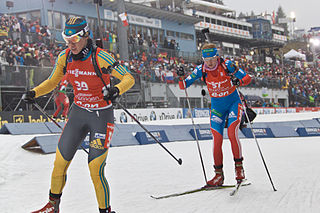 Drinovec in 2016 | |
| Personal information | |
|---|---|
| Nationality | Slovenian |
| Born | 22 February 1996 |
| Sport | |
| Sport | Biathlon |
Mitja Drinovec (born 22 February 1996) is a Slovenian biathlete. He competed in the 2018 Winter Olympics. [1]
 Drinovec in 2016 | |
| Personal information | |
|---|---|
| Nationality | Slovenian |
| Born | 22 February 1996 |
| Sport | |
| Sport | Biathlon |
Mitja Drinovec (born 22 February 1996) is a Slovenian biathlete. He competed in the 2018 Winter Olympics. [1]
All results are sourced from the International Biathlon Union.
0 medals
| Event | Individual | Sprint | Pursuit | Mass start | Relay | Mixed relay |
|---|---|---|---|---|---|---|
| | 80th | 72nd | — | — | 10th | — |
0 medals
| Event | Individual | Sprint | Pursuit | Mass start | Relay | Mixed relay | Single mixed relay |
|---|---|---|---|---|---|---|---|
| | — | 85th | — | — | — | — | 26th |

Bonnie Kathleen Blair is a retired American speed skater. She is one of the top skaters of her era, and one of the most decorated athletes in Olympic history. Blair competed for the United States in four Olympics, winning five gold medals and one bronze medal.

Curling was included in the program of the inaugural Winter Olympic Games in 1924 in Chamonix although the results of that competition were not considered official by the International Olympic Committee until 2006. Curling was a demonstration sport at the 1932 Games, and then again after a lengthy absence in 1988 and 1992. The sport was finally added to the official program for the 1998 Games in Nagano.

Russia, referred to by its formal name; the Russian Federation, by the International Olympic Committee, has competed at the modern Olympic Games on many occasions, but as different nations in its history. As the Russian Empire, the nation first competed at the 1900 Games, and returned again in 1908 and 1912. After the Russian revolution in 1917, and the subsequent establishment of the Soviet Union in 1922, it would be thirty years until Russian athletes once again competed at the Olympics, as the Soviet Union at the 1952 Summer Olympics. After the dissolution of the Soviet Union in 1991, Russia competed as part of the Unified Team in 1992, and finally returned once again as Russia at the 1994 Winter Olympics.

Canada has competed at every Winter Olympic Games, and has won at least one medal each time. By total medals, the country's best performance was in the 2018 Winter Olympic Games where Canadian athletes won 29 medals. Canada set a new record for most gold medals won by a country in a single Winter Olympics with 14 at the 2010 Winter Olympics in Vancouver, Canada. This achievement surpassed the previous record of 13 gold medals held by the Soviet Union (1976) and Norway (2002). Both Germany and Norway matched the record total of 14 gold medals in Pyeongchang in 2018. This record has since been surpassed by Norway with 16 at the 2022 Winter Olympics.

Snowboarding is a sport at the Winter Olympic Games. It was first included in the 1998 Winter Olympics in Nagano, Japan. Snowboarding was one of five new sports or disciplines added to the Winter Olympic program between 1992 and 2002, and was the only one not to have been a previous medal or demonstration event. In 1998, four events, two for men and two for women, were held in two specialities: the giant slalom, a downhill event similar to giant slalom skiing; and the half-pipe, in which competitors perform tricks while going from one side of a semi-circular ditch to the other. Canadian Ross Rebagliati won the men's giant slalom and became the first athlete to win a gold medal in snowboarding. Rebagliati was briefly stripped of his medal by the International Olympic Committee (IOC) after testing positive for marijuana. However, the IOC's decision was reverted following an appeal from the Canadian Olympic Association. For the 2002 Winter Olympics, giant slalom was expanded to add head-to-head racing and was renamed parallel giant slalom. In 2006, a third event, the snowboard cross, was held for the first time. In this event, competitors race against each other down a course with jumps, beams and other obstacles. On July 11, 2011, the International Olympic Committee's Executive Board approved the addition of Ski and Snowboard Slopestyle to the Winter Olympics roster of events, effective in 2014. The decision was announced via press conference from the IOC's meeting in Durban, South Africa. A fifth event, parallel slalom, was added only for 2014. Big air was added for 2018.

Short-track speed skating has been a contest at the Winter Olympics since the 1992 Winter Games in Albertville, France. Prior to that, it was a demonstration sport at the 1988 games. The results from the 1988 demonstration competition are not included in the official Olympic statistics. The sport has been dominated by teams from East Asia and North America, namely South Korea, China, Canada and the United States. Those four countries have won 147 of 195 medals awarded since 1992. South Korea leads the medal tally, with 53 medals including 26 golds since 1992. The majority of medals that South Korea and China have won at the Winter Olympics come from short-track speed skating.
Mitja Petkovšek is a former Slovenian gymnast. Petkovšek is a specialist in parallel bars, where he was the world champion, World Cup Final champion, and European champion. He has a total of 12 World Championship, World Cup Finals, and European Championship medals, 7 of which are gold. He is married to Mojca Rode, a Slovenian rhythmic gymnast. He also competed at the 2000 Summer Olympics and 2008 Summer Olympics.
Kim Dae-eun is a South Korean gymnast.
Mitja Kunc, is a former Slovenian alpine skier.

Canada has sent athletes to every Winter Olympic Games and every Summer Olympic Games since its debut at the 1900 games with the exception of the 1980 Summer Olympics, which it boycotted along with the USA and other countries. Canada has won at least one medal at every Olympics in which it has competed. The Canadian Olympic Committee (COC) is the National Olympic Committee for Canada.

Slovenia first participated as an independent nation at the Olympic Games at the 1992 Winter Olympics in Albertville, France, and the country has sent athletes to compete at every Games since then. The Slovenian Olympic Committee was established in 1991 and was recognised by the International Olympic Committee on 5 February 1992.

The CIS national ice hockey team was an ephemeral national ice hockey team that represented the Commonwealth of Independent States. Essentially the former Soviet team under a different name, the CIS team existed in the few months between the dissolution of the Soviet Union and the formation of new ice hockey federations for the former Soviet states, now independent countries. Most notably, the team competed at the 1992 Winter Olympics as part of the Unified Team, winning the gold medal. However, the International Ice Hockey Federation would later attribute this gold medal to Russia as the successor state. The International Olympic Committee does not attribute that medal to Russia. After the Olympics, the CIS team ceased to exist and was replaced by the Russian team. In the 13 games the CIS played, they won 11 and lost 2.

Darya Klimina is a Kazakhstani biathlete. She competed at the Biathlon World Championships 2012 and the Biathlon World Championships 2013. She competed at the 2014 Winter Olympics in Sochi and the 2018 Winter Olympics in South Korea.

Slovenia competed at the 2018 Winter Olympics in Pyeongchang, South Korea, from 9 to 25 February 2018. 71 athletes competed in 9 sports, including the men's national ice hockey team.

Joanne Firesteel Reid is an American biathlete. She competed at the 2018 Winter Olympics, and 2022 Winter Olympics, in Women's mass start, Women's relay, Women's pursuit, Women's individual, and Women's sprint.
The women's 1500 metres speed skating competition of the 2018 Winter Olympics was held at the Gangneung Oval in Gangneung on 12 February 2018.

Jeremy Finello is a Swiss biathlete. He competed in the 2018 Winter Olympics.